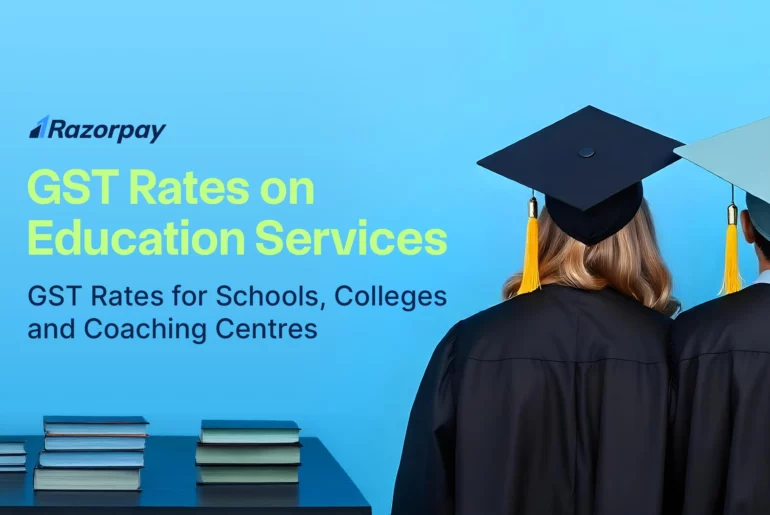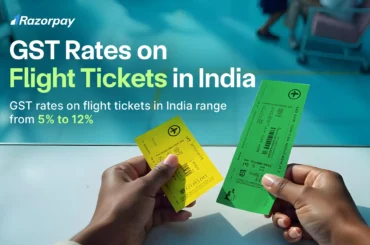GST (Goods and Services Tax), implemented on 1st July 2017, unified various state and central taxes into a single tax system, impacting educational institutions that were previously tax-exempt. This article delves into the GST rates applicable to different educational services, the exemptions available, the impact on the education sector, and the latest updates regarding GST on education.
GST Rates on Education Services
GST rates on education services in India range from 5% to 28%, varying significantly depending on the type of service provided. While basic educational services, such as those offered by pre-schools, schools, and certain higher education institutions, are generally exempt from GST, other services like private coaching, vocational training, and ancillary services such as transportation and catering are subject to GST.
Let’s take a look at the GST implications for various educational institutions and their tax liabilities:
GST Rate on School Education
The GST rate on school education is primarily exempt for most institutions. This exemption applies to government-run schools, schools managed by local authorities, and non-profit organizations. These institutions do not attract GST due to the fundamental importance of education as a public service.
However, there is some exemption:
Private Schools: If a school is operated by a for-profit organization, it may be subject to an 18% GST rate. This GST applies to tuition fees and other educational services provided by the school. These schools can also claim Input Tax Credit (ITC), which allows them to offset the GST paid on their inputs.
GST Rate on Higher Education
The GST rate for higher education services in India is 18%. This applies to institutions like colleges, universities, and professional courses.
However, there are certain exemptions:
- Non-profit institutions: Educational institutions run by the government, local bodies, or trusts are generally exempt from GST.
- Courses leading to recognized qualifications: Programs leading to degrees or diplomas recognized by government bodies like UGC or AICTE might be exempt.
- Specific vocational courses: Some vocational courses approved by the government may also be exempt.
It’s crucial to note that the exemption status depends on specific criteria and can vary. Private institutions, coaching centers, and professional courses are generally subject to the 18% GST rate.
GST Rate on Vocational Training and Coaching
Vocational training, coaching classes, and private tutorials are generally subject to an 18% GST rate. This includes coaching for competitive exams such as JEE, NEET, UPSC, and other professional courses.
However, there are specific exemptions under certain conditions:
- Government-approved vocational courses: Skill development programs approved by the National Skill Development Corporation (NSDC) may be exempt from GST.
- Specific exemptions: Certain vocational courses aligned with national priorities or social welfare objectives might qualify for GST exemptions.
GST Rate on Distance Education
Distance education services are generally subject to a GST rate of 18%.
However, there are some exceptions:
- Government-recognized institutions: Distance education programs offered by universities or colleges recognized by government authorities like UGC or AICTE might be exempt from GST. For instance, distance MBA programs offered by IGNOU (Indira Gandhi National Open University) would typically be exempt.
- Specific vocational courses: Certain vocational courses approved by the government may also be exempt.
GST Rate on Online Courses and Training
Online courses and training programs are taxed at 18% GST rate. These course have gained significant popularity in recent years.
- Government-run platforms: Online courses offered by government-run platforms may be exempt from GST, similar to traditional education services.
- Private online education providers: Most private online education platforms and coaching institutes are subject to the 18% GST rate.
GST Rates on Education Materials
Educational institutions often supply materials alongside their services. The GST rates for these materials vary:
- Essential textbooks and stationery: These items, including notebooks, pens, pencils, and erasers, are subject to a concessional GST rate of 5% to 12%.
- Non-essential items: Products like school uniforms, bags, and certain types of stationery might attract a higher GST rate of 18%.
- Printed materials: Materials like question papers, answer sheets, and printed study materials are generally subject to a GST rate 12% to 18%.
It’s essential to note that the specific GST rate for an educational material depends on its classification and HSN code.
Related Read: GST Rate on Stationary Items
GST Rates on Ancillary Services Provided to Educational Institutions
While the core educational services provided by schools, colleges, and universities are generally exempt or taxed at a concessional rate, ancillary services offered by these institutions are subject to GST.
- Transportation: Services provided for the transportation of students and staff are typically taxed at a 5% GST rate with input tax credit (ITC) available.
- Catering services: Services like mid-day meals provided to students within educational institutions are taxed at a 18% GST rate.
- Rental services: Rental income from immovable property like classrooms, hostels, or administrative buildings is taxed at an 18% GST rate.
GST Exemptions Available to Educational Institutions
While the majority of educational services are subject to GST, certain institutions and services qualify for exemptions:
Charitable Trusts
- Schools, colleges, or educational institutions run by charitable trusts for:
- Abandoned or orphaned children
- Homeless children
- Physically or mentally abused persons
- Prisoners
- Persons over 65 years residing in rural areas
Government and Local Authorities
- Exempt from GST for education: Educational activities by government or local authorities (e.g., government schools, municipal schools)
National Skill Development Corporation (NSDC)
Exempt Services:
-
- Education by NSDC
- Approved sector skill councils and assessment agencies
- National skill development programs approved by NSDC
- Vocational skill development programs under national skill certification and monetary reward scheme
- Training partners under any NSDC-implemented scheme
Indian Institutes of Management (IIMs)
Exempt Programs:
-
- 2-year full-time residential PG programs in Management (admission via CAT)
- Fellowship programs in Management
- 5-year integrated programs in management studies (excluding Executive Development Programs)
GST Impact on the Education Sector
The introduction of GST on services like coaching, vocational training, and certain educational materials has led to increased costs for students and parents. This could potentially affect the affordability of education, especially for economically weaker sections of society.
Increased Costs for Students and Parents
- Higher tuition fees: To offset the additional tax burden, many private educational institutions have increased tuition fees, making education more expensive for students.
- Costly educational materials: With GST applicable on various stationery items and textbooks, the overall cost of education has risen for students.
Impact on Accessibility
- Limited access for disadvantaged students: The increased cost of education due to GST can hinder access for students from economically weaker backgrounds.
- Potential for reduced enrollment: Higher fees might discourage students from pursuing higher education or opting for more affordable alternatives.
Impact on Quality of Education
While GST has increased the revenue for the government, its impact on the quality of education is complex. Increased costs for educational institutions might lead to:
- Reduced expenditure on infrastructure and faculty: To maintain profitability, institutions may cut back on investments in facilities and human resources.
- Focus on fee generation: There’s a risk of institutions prioritizing fee collection over academic excellence.
What Were the Laws on Educational Institutions Before GST?
Prior to the implementation of GST, the education sector was primarily governed by the Service Tax regime. The Mega Exemption Notification (ST-25/2012) provided a significant exemption to educational institutions, covering services like:
- Pre-school education
- Primary education
- Secondary education
- Higher secondary education
This exemption aimed to make education more accessible and affordable. However, there were still certain ancillary services provided by educational institutions that were subject to service tax.
The introduction of GST brought about significant changes to the tax landscape for the education sector, impacting both institutions and students.
Should Educational Institutions Register for GST?
The GST registration requirement for educational institutions depends on their specific circumstances.
Exemption from GST Registration
- Non-profit institutions: Educational institutions run by charitable trusts, government bodies, or local authorities providing pre-school to higher secondary education are generally exempt from GST registration.
- No taxable services: Institutions offering only exempt educational services and with an annual turnover below the GST registration threshold can avoid registration.
Mandatory GST Registration
- Taxable services: Educational institutions providing coaching, vocational training, or other taxable services with an annual turnover exceeding the GST registration threshold must register.
- Ancillary services: Institutions offering ancillary services like transportation, hostel accommodation, or catering are generally required to register for GST.
It’s crucial for educational institutions to carefully assess their operations and determine their GST registration obligations. Consulting with a tax professional can provide clarity and ensure compliance.
GST on Educational Services: Latest Updates and Implications
A notable amendment was introduced in the 49th GST Council meeting, expanding the scope of GST exemption for educational institutions. Central and State government-established authorities, boards, or bodies conducting entrance examinations are now exempt from GST. This includes organizations responsible for conducting exams like JEE, NEET, and other competitive tests.
This exemption aims to further support the education sector and reduce the tax burden on students appearing for these crucial examinations.
Related Read: GST on Hostels & PGs
Conclusion
GST has brought both opportunities and challenges to India’s education sector. While it simplifies tax processes and boosts revenue, it also complicates the taxation of educational services. Exemptions help keep essential education accessible, but GST on ancillary services and private institutions could affect affordability and quality. Staying updated on GST regulations is crucial for institutions to manage these changes effectively and uphold their educational mission.
Frequently Asked Questions
1. What is the GST rate for online education?
Online education services typically attract an 18% GST rate. Government-run platforms may offer some courses exempt from GST or at different rates, but private online education providers generally charge GST at 18%.
2. How much GST is on an educational grant?
Educational grants are generally exempt from GST if provided by governmental or charitable entities specifically for educational purposes.
3. Is GST charged on education loans?
Education loans themselves are not subject to GST. However, the services related to the processing of these loans by financial institutions may attract GST.
4. Is GST applicable on examination fees?
Examination fees charged by educational institutions are typically exempt from GST if they are part of the core educational services provided by the institution.
5. Are universities exempt from GST?
Universities are exempt from GST on educational services if they are run by charitable trusts, government, or local authorities. Private universities may be liable for GST depending on their revenue and services.
6. Which education services are exempt from GST?
Education services provided by government institutions, charitable trusts, and certain recognized programs such as those under the National Skill Development Corporation (NSDC) are generally exempt from GST.
7. How is GST calculated on fees for hostel accommodation provided by educational institutions?
Hostel accommodation fees provided by educational institutions are typically exempt from GST if they are part of the institution’s educational services.
8. Is GST applicable to transportation services provided by educational institutions?
Transportation services provided by educational institutions are subject to 5% GST with an input tax credit (ITC) available.
9. What is the GST rate on catering services provided by educational institutions?
Catering services, such as mid-day meals, provided by educational institutions are taxed at 18% GST without input tax credit (ITC).
10 Are books and stationery items sold by schools or colleges subject to GST?
Books are generally exempt from GST, while stationery items are taxed at 5% to 12% GST.



